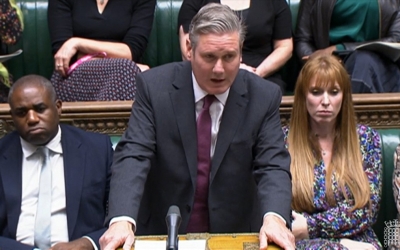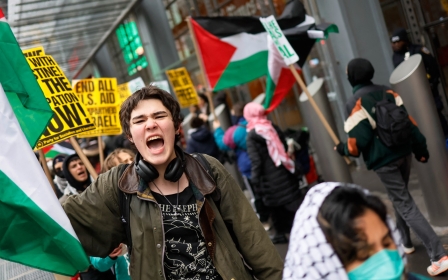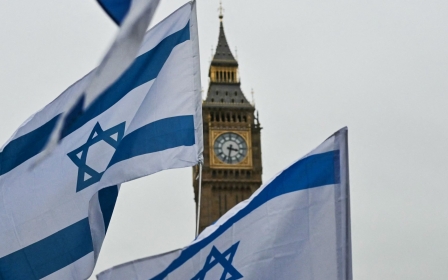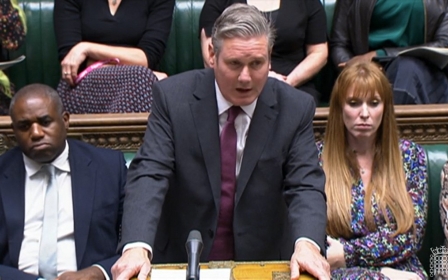How Israel's genocide in Gaza sparked a protest movement in the UK
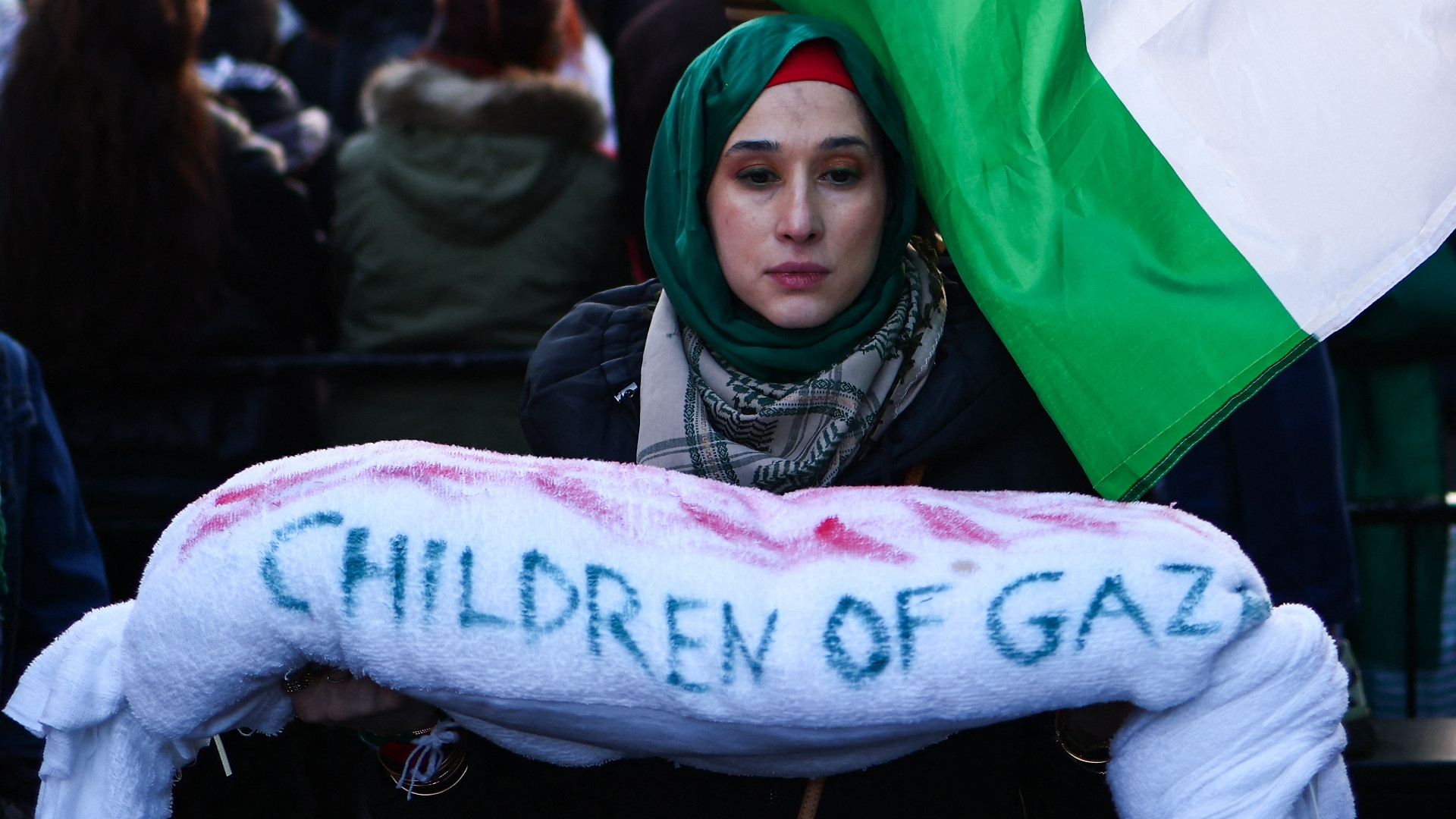
Since 7 October, Palestinians and their allies have been consumed by the horrors of Israeli aggression in Gaza, marching week after week across the globe to express their outrage amid an ever-rising death toll. More than 18,000 Palestinians have been killed so far, including nearly 8,000 children, with thousands more missing. Western leaders, however, continue to regurgitate tired talking points, emphasising Israel's "right to defend itself", while paying lip service to calls for restraint in its ongoing bombardment.
In the UK, public solidarity with Palestinians has been characterised as "hateful" by some senior politicians who have employed dangerous rhetoric when describing the largely peaceful protests. Whether it is waving the Palestinian flag or chanting "from the river to the sea", many acts of solidarity have been demonised within the political sphere while simultaneously being venerated by the public.
Today's war on Gaza is widening the gap between the will of the public and that of their political representatives. Even those who have grown accustomed to the polarising politics of recent years have identified the so-called Israeli-Palestinian conflict as one of the most acutely divisive issues of our era.
A growing movement
Since Israel launched its assault on Gaza, dozens of marches have been held across the world each week, indicating a dramatic rise in global support for Palestine. In London, the number of protesters has doubled each week. From 150,000 to 300,000 and then to 800,000 people, according to the Palestine Solidarity Campaign, the figures and diversity of Palestine supporters soared.
The shocking scale and intensity of destruction and killing in Gaza have triggered the numbest of nerves and turned many into overnight activists
For many who attend, the swell of collective comradery is a rainbow in this typhoon of violence. Arabs and Palestinians are well-primed to rally in their all-too-common hours of need, but this is different.
This movement isn't dwindling off into the night after a weekend of chants to a darbuka beat. This solidarity with Palestine is growing and galvanised.
The shocking scale and intensity of destruction and killing in Gaza have triggered the numbest of nerves and turned many into overnight activists. With 75 years of injustice for Palestine preceding current events, there's long-standing anger and resentment at western governments' complicity feeding into today's activism. In the omnipresent shadow of grief and despair are those who are driven to act and to advocate for Palestine.
Follow Middle East Eye's live coverage for all the latest on the Israel-Palestine war
Another pervasive feeling that is challenging some people's ability to participate in the Palestine solidarity movement, however, is fear. Across industries and worldwide, hundreds of people have reported being censored, harassed, losing their jobs and, in extreme cases, being violently attacked for supporting a ceasefire in Gaza.
British police have deployed their powers to interrogate and sometimes arrest pro-Palestine supporters for language used at protests or on social media. Students have said they've been referred to the UK's anti-terrorism Prevent programme by their educators for taking part in strike action for Palestine.
"I want to go but after I saw some of the consequences people were facing, I got paranoid about going to protests or posting anything on social media," a pro-Palestine British-Syrian mother told me at a recent informal gathering, explaining her internal dilemma.
It is perhaps why organising, particularly within a community of like-minded and skilled people, seems so critical right now. Many feel that the comradery creates a safety net for those who are feeling vulnerable to the more repressive and anti-Arab policies and narratives now.
Indeed, despite the disparate threats they've faced, the marches have been a critical opportunity for people to connect, form networks and coordinate actions. Palestinians and their allies are finding a community and building something that feels critical.
Omar Lababedi, a London-based British-Syrian entrepreneur, created a Palestine activism group with more than 150 people. It began as a small pre-march breakfast club but quickly morphed into an organised network as more people felt compelled to do more to try and bring about a ceasefire in Gaza.
The network, which combines community care with activist work, has multiple channels where information about sit-ins, marches, media monitoring, social media campaigns and more are shared and coordinated.
"The main aim of the community is to provide the infrastructure for more empowered activism. It is a platform to enable people who want to do more to do it effectively," Lababedi said. "We're hoping to build deeper connections within the community so that people feel less alone and part of a wider community."
With dedicated channels for different subjects, the networks leverage tech to streamline initiatives and build resources, directories and sub-working groups. Lababedi stressed that regular community events involving music, dance and food are "just as important as the activism itself to avoid us burning out".
It is also a place for those who fear that public displays of solidarity with Palestine might affect their job or visa status to stay connected and involved with the movement.
Lababedi has long been sympathetic to the Palestinian cause, but his current work advocating and organising "has taken over [his] life".
"What we're witnessing today is like nothing before. And then the way that the world reacted, particularly in the first few weeks, felt like a dystopian reality. It made being active a necessity for us as human beings. It is a watershed moment."
'A marathon, not a sprint'
Grassroots in nature, much of the new activist work on Palestine in the UK is decentralised with campaigns spearheaded by individuals who are committed to using their energy and skills to bring justice for Palestine. Whether they're organising a vigil, press conference, an ad hack (advertising hack) campaign or petitioning MPs, these individuals tap into their networks for support, exposure and momentum, building larger connected communities of Palestine solidarity in the process.
Two months ago, Dr Omar Abdel-Mannan never imagined he would be a prolific voice across British television news channels.
"I hated public speaking before but that fear barrier has gone now. There are more important things than that," the British-Egyptian paediatric neurologist, and creator of the Gaza Medic Voices social media account, says.
Having visited Gaza as part of a humanitarian medical training programme, Abdel-Mannan's direct connections there meant he could directly relay to the world the harrowing conditions they were operating under as Israeli bombs dropped.
“When I heard that al-Ahli Hospital was bombed, I wanted to scream. The next day I woke up and decided to get my voice heard. Every concern I ever had about my job, my family and my career went out the window. I just thought, if I don't do it then I can't live with myself," Abdel-Mannan says.
Within weeks of sharing medics' testimonies and pictures from Gaza, the account accumulated more than 90,000 followers on Instagram and the humanitarian doctor has appeared on dozens of radio and TV shows to advocate for a ceasefire and the protection of healthcare workers, at least 250 of whom have been killed in Gaza since 8 October.
It has been relentless work, and the consumption of so much tragic violence has taken a personal toll, but Abdel-Mannan says he is committed to advocating for the protection of healthcare in Gaza.
"I'm realising that this is a marathon, not a sprint. I don't think my media appearances are going to stop the death toll today, but I hope it will have a long-term impact," he added. "I think the solution is going to come from people like us in the West who can use our structures of democracy and free speech to create a counter-narrative."
Affecting Westminster's policies on Palestine is key to ending the bloodshed in Gaza and seeking justice for Palestinians
The impact of the coordinated organising can be seen in slowly shifting narratives in western media and within the UK parliament where MPs are increasingly facing pressure from constituents to call for an end to the war on Gaza.
Nevertheless, the pro-Israel lobby's strong influence among the UK's political elite remains a major challenge to advancing any pro-Palestine narrative and will need to be considered when shaping how the movement organises itself going forward.
"Ultimately, the aim is to expand the community network of allied activists to be more politically effective and bring about change in the UK government," explained Lababedi.
Affecting Westminster's policies on Palestine is key to ending the bloodshed in Gaza and seeking justice for Palestinians, but the complex intractability of this conflict means the movement must brace itself with faith and stamina for that "marathon" of a journey.
The views expressed in this article belong to the author and do not necessarily reflect the editorial policy of Middle East Eye.
Middle East Eye propose une couverture et une analyse indépendantes et incomparables du Moyen-Orient, de l’Afrique du Nord et d’autres régions du monde. Pour en savoir plus sur la reprise de ce contenu et les frais qui s’appliquent, veuillez remplir ce formulaire [en anglais]. Pour en savoir plus sur MEE, cliquez ici [en anglais].



